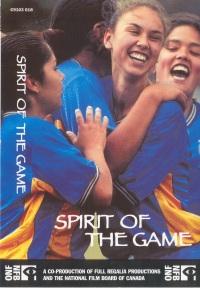| ________________
CM . . .
. Volume XI Number 8 . . . . December 10, 2004
This engaging video follows the lives of several aboriginal athletes from British Columbia as they prepare to compete at the North American Indigenous Games in Winnipeg, Manitoba, in 2002. The video focuses on boxer Robbie McGregor, archer Morgan Desjarlais, runner Buzz Manuel, Jr., rower Joe Seward, runner Veronica Charters and soccer player Jennifer Johnson. However, their other team players, parents, coaches and referees both comment on the trek towards the NAIG and demonstrate their own roles in the success of these fine young athletes. The role of the community is stressed as athletes struggle with fundraising and the disappointment of not being allowed to compete because their registration was not sent in on time. Both coaches and referees speak about the raw talent of the aboriginal athletes only needing to be supported and shaped for it to rise to national standards. The athletes, themselves, are forthright, optimistic and proud of the training they have done to meet their goals. They are excited about competing in a huge, North American games situation. However, it is also clear that their commitment is to their people and to representing the aboriginal communities they are from. Some of the athletes compete individually, like Morgan Desjarlais, whose calm, steely focus helps her to hit the bull's eye in archery. Others, like Jennifer Johnson or Joe Seward, are part of a team that has to learn to pull together to achieve success. However, they all find that their fervent drive for success has totally changed their approach to life. As Veronica says, running feels like "1000 drums - a beautiful song of my heart and the land connected." Buzz coaches younger teenagers in order "to open doors and create better people." Joe Seward speaks of the "togetherness" of rowing and the strength he feels from his ancestors who raced war canoes. Jennifer Johnson says it for them all when she speaks about how soccer keeps her healthy, balanced and improving in her life as she plays from the heart. These athletes have also been excellent role models for the younger aboriginals on their own reserves as their strong, aggressive challenge helps them to reach their goals. Archival film footage and still photographs of famous aboriginal athletes, like Tom Longboat, Billy Mills, Roger Adolf, Alwyn Morris and Waneek Horn-Miller, reinforce the theme: what matters is the spirit of the games, the commitment to a strong spirit and faith in yourself and your culture. The featured athletes are briefly introduced, and they speak about how they began in the sport and how they trained. Haunting scenes of nature on the reserves and outstanding footage of the sports in action (especially the soccer and the rowing sequences) help to reinforce the isolation of these athletes and the talent required to succeed. The film returns twice to the same athletes as they win at the provincial level and as they compete in Winnipeg. Some, like Jennifer and her soccer team, win gold medals, but for others, just being at the games was a significant victory that will probably change their lives forever. At the beginning of the video, there is a still shot of an older aboriginal man drawing a bow and arrow. Then the camera moves downward to show that a young boy is also holding the bow, learning how to shoot it. This one shot epitomizes the spirit of this video: learning a difficult skill with the coaching of elders (coaches) who are determined to pass on to the future their values and strength. Spirit of the Game could be used by coaches or in aboriginal units of study to highlight either the focus and determination required to compete at a very high level, or the spiritual lessons of our native people. Recommended. Joan Marshall is the teacher-librarian at Fort Richmond Collegiate, Winnipeg, MB.
To comment
on this title or this review, send mail to cm@umanitoba.ca.
Copyright © the Manitoba Library Association. Reproduction for personal
use is permitted only if this copyright notice is maintained. Any
other reproduction is prohibited without permission.
NEXT REVIEW |TABLE OF CONTENTS FOR THIS ISSUE
- December 10, 2004.
AUTHORS
| TITLES | MEDIA REVIEWS
| PROFILES
| BACK ISSUES
| SEARCH | CMARCHIVE
| HOME |
